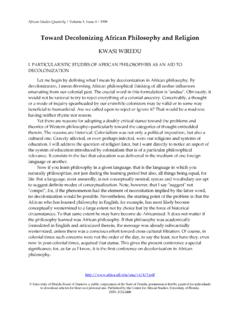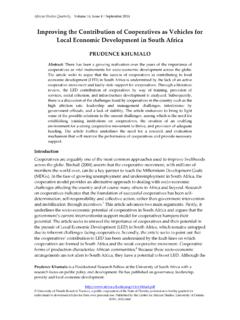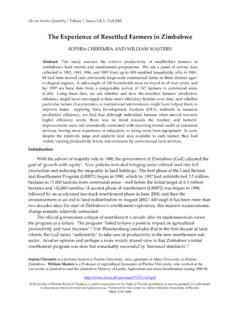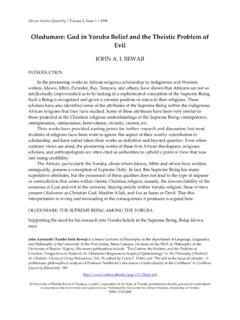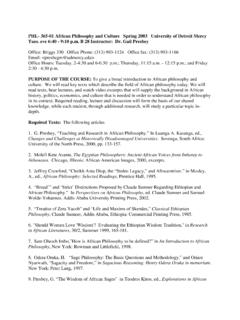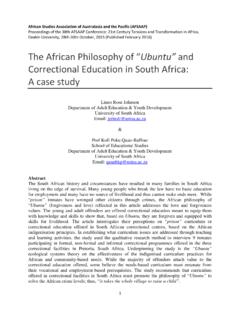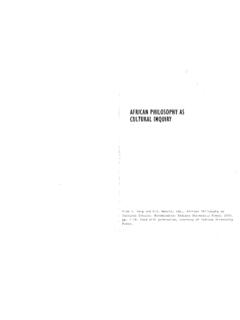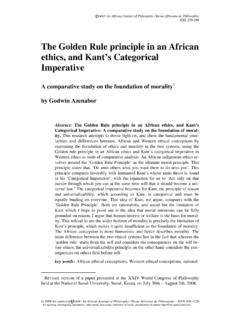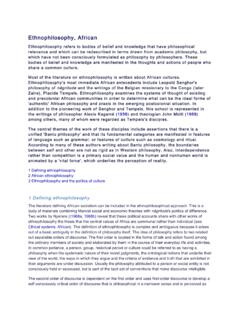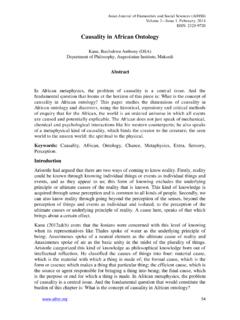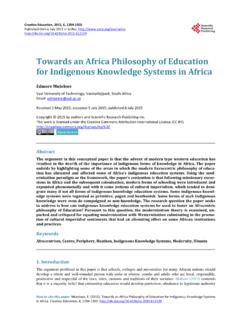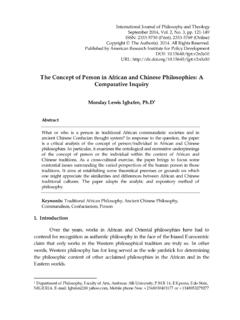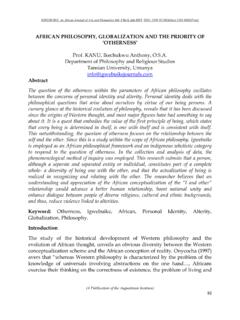Transcription of A Critique of the Concept of Quasi-Physicalism in Akan ...
1 african Studies Quarterly | Volume 14, Issues 1 & 2| November 2013 Hasskei Mohammed Majeed lectures in philosophy at the University of Ghana. With a strong interest in traditional and modern african philosophy , his research interests include personal identity and supernaturalism. His most recent publications God Is Not a Referee and Supernaturalism and the Philosophical Character of the Traditional african Thinker bear testimony to his interest in african metaphysical thought. The Universities of South Africa and Ghana supported the doctoral research on which this article is largely based. University of Florida Board of Trustees, a public corporation of the State of Florida; permission is hereby granted for individuals to download articles for their own personal use. Published by the Center for african Studies, University of Florida. ISSN: 2152-2448 A Critique of the Concept of Quasi-Physicalism in Akan philosophy HASSKEI MOHAMMED MAJEED Abstract: One important feature of recent african philosophical works is the attempt by writers to interpret some key concepts from within the context of specific african cultures.
2 The interpretations of such writers, however, particularly in connection with Akan thought, have not been without problems. One such Concept is the Concept of a person. From the largely general position that a completely physical conception of the person is inconsistent with Akan cultural beliefs, the precise characterization of the non-physical constituent of the human being has been a source of great controversy. An expression that has of recent times been put forward as descriptive of that constituent is the quasi-physical. The notion of Quasi-Physicalism is the brainchild of an Akan philosopher, Kwasi Wiredu, and is strongly held also by Safro Kwame, another Akan philosopher. This article attempts an explanation of the notion and argues that it is conceptually flawed in diverse ways, and as such philosophically indefensible. Introduction The philosophical ideas of any culture, including the Akan, may be obtained from the language, beliefs, and practices of that culture.
3 In this regard, an examination of some Akan cultural beliefs and language should aid in the understanding of the Akan Concept of a person. In Akan language, the human body is referred to as honam, but there are two other expressions, kra and sunsum, which, together with honam, seem to suggest belief in the existence of two distinct components of the human being. These expressions are sometimes translated as soul or mind and spirit respectively and designated as being spiritual. Akan thinkers who hold spiritual conceptions of these entities include Asare Opoku, Peter Sarpong, and Kwame Even though Sarpong, for instance, correctly translates sunsum as spirit, he nonetheless sees it as deriving from the father an error that Gyekye points It is also held in Akan thought that the kra does not, just like the sunsum, form part of the brain or the body because of its complete spirituality.
4 It is nonetheless believed to play some role in the person s ability to live, as it is seen to be a life force with spiritual attributes. It is these spiritual conceptions of kra and sunsum that Kwasi Wiredu and Safro Kwame reject. They argue for reasons that I will explain in detail in the next section that kra and sunsum are not spiritual but are rather quasi-physical. 24 | Majeed african Studies Quarterly | Volume 14, Issues 1 & 2| November 2013 The assessment of beliefs as evidence for the existence of these spiritual entities by contemporary Akan philosophers has chiefly been based on the logical implications of specific cultural beliefs regarding the activities of those entities. But, it is these same sources of evidence (language, beliefs, and the practices that those beliefs underlie) that have ironically led some to argue against the metaphysical conceptions of kra and sunsum.
5 Wiredu and Kwame, to be specific, explain that these entities are spoken of in physical terms and are capable of partially assuming spatial Thus, kra and sunsum should accurately be described as quasi-physical, since they are not believed, in these philosophers view, to be purely physical either. This article aims at resolving the controversy surrounding the interpretations offered by the metaphysical theorists and the quasi-physicalists in connection with kra and sunsum. The article is a sustained Critique of the doctrine of Quasi-Physicalism , which it considers seriously blemished. Ultimately, it affirms the metaphysical in an indirect manner. The article, therefore, rejects the quasi-physicalist s argument that the kra, especially, cannot be regarded as spiritual because (i) it falls in between the physical and the so-called spiritual realms and is closer to the physical, (ii) it is believed to accept offerings, (iii) it is capable of rendering itself visible to medicine men, (iv) medicine men use physical or partially physical means to reach to the kra, and that (v) the kra is thought of as a person s The article finally argues that aspects of the doctrine of Quasi-Physicalism itself are utterly inconsistent with some basic Akan beliefs.
6 Hence, the spiritual conception of kra is not wrong. The multidisciplinary appeal of the subject matter of this article is not surprising at all. Matters regarding the constitution of the human being have not only been explored by thinkers of varied cultures, but also are a subject of study across a number of academic disciplines such as philosophy , religion, psychology, anthropology, and comparative cultural studies. This article intends to influence contemporary debates about african or Akan thought, thereby providing possible ways of enhancing the understandings (in the academic fields mentioned above) of the constitution of the human being. It corrects the misinterpretations of the quasi-physicalist, highlighting the part-spirituality of the human being. The spiritual aspect of the person, which is also believed to survive death (that is, the kra), is the subject often mentioned in the traditional Akan religious practice of libation pouring.
7 It is also believed to be capable of enforcing morality in the physical human community. Also, the clarity that this article gives to the Concept of the kra (mind) provides useful information for scholars interested in (i) the question of whether or not kra (mind) differs from adwene (thought) and amene (brain), and (ii) the issue of whether or not any relationships exist among the three. It could, for instance, be observed that the article does not point in the direction of the mind being part of the body or the brain; nor is the mind shown to be physical or quasi-physical. Studies of Akan psychology and culture, and indeed african studies, could thus benefit from the philosophical analysis embarked upon in this article. Finally, the postulation of Quasi-Physicalism , amidst its many problems, is an interesting exercise in contemporary Akan philosophy . It even offers some ideas that compare with aspects of Western philosophy .
8 Its rejection of the spirituality or, rather, part-spirituality of the human being is, in some respects, consistent with the conventional attitude toward the metaphysical in some Western conceptions. In modern Western philosophy , discussions on personal identity often go back to Descartes who, in his Meditations on First philosophy , postulated a metaphysical mind in addition to the body. Yet, Quasi-Physicalism in Akan philosophy | 25 african Studies Quarterly | Volume 14, Issues 1 & 2| November 2013 the mind is seen by anti-metaphysians such as Armstrong and Place as not different from brain processes, which to them is quite Armstrong notes, The mind was not something behind the behavior of the body, it was simply part of that physical behavior. 6 He calls this a Materialist or Physicalist account of the mind. 7 What distinguishes Wiredu and Kwame from the Western anti-metaphysians, however, is their apparent admission that the kra, for instance, is indeed an entity distinguishable from the body and capable of existing after death.
9 But, while Gyekye accepts the idea of the immortality of the kra, he seems to suggest that at death, the surviving entity is a union of kra and sunsum which, together, constitute one spiritual component of the human Therefore, Gyekye s position, although not necessarily Cartesian, is ultimately dualistic; and I am more inclined toward it than toward Wiredu s and Kwame s. Some conceptual clarifications, however, have to be made now. It can be drawn from the above criticisms, first, that Armstrong and Place reduce the mind to the physical or material. And, that the mind is seen by them as fundamentally bodily and perceptible. But it is instructive to note that materialism may not mean the same as physicalism. Thus, conscious efforts must always be made not to conflate them. Before I explain why, however, I should acknowledge that even though Armstrong does not make any careful distinction between materialism and physicalism in the preceding paragraph, he calls elsewhere for such a distinction.
10 9 It is consistent with the doctrine of physicalism to affirm as an existent anything which is a physical object or, at least, describable in a language of physics. 10 This implies that in certain cases an intangible object would pass for the physical provided what is said about it is compatible with the laws of physics. Materialism, on the other hand, misleadingly seems to conjure up a Newtonian account of matter. 11 That account admits of only the tangible, as inherent in Newton s theory of gravitational fields where matter attracts matter. Materialism and physicalism are, therefore, not the same. Quasi-Physicalism : A Critique Quasi-Physicalism is the philosophy that considers as existent objects belonging to a category between the realm of the obviously physical, those objects that obey the known laws of physics, and the realm of the so-called spiritual or completely immaterial objects.
